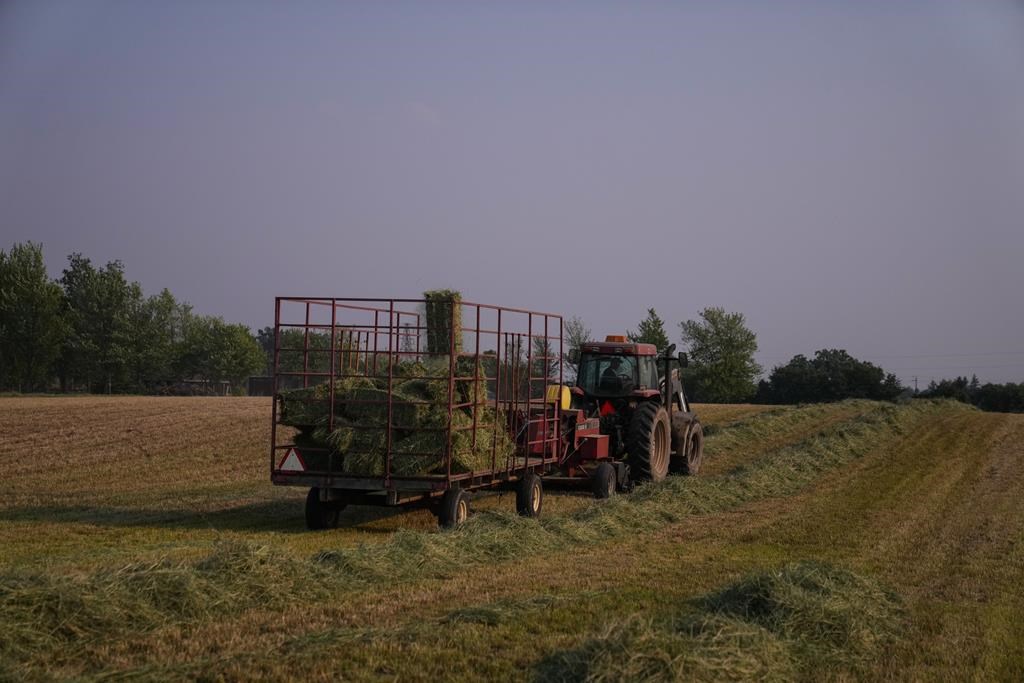Rural farmers in Hamilton, Ont., will have to pay a new annual stormwater fee despite attempts to quash it this past year over claims it’s a tax that takes hundreds of dollars out of pockets each year.

Characterized by some dissenters as a “rain tax,” the city is introducing the fees in 2026 to cover costs in managing sewage spills and other climate change-related impacts across the region.
It’s based on the premise the city is currently underfunding its water and sewer infrastructure by tens of millions of dollars each year.
Houses, businesses, and farms are expected to be charged on how many “impervious surfaces” the properties have that direct rainwater into the sewers, like paved parking lots.
Recommendations from a report presented during the general issues committee Wednesday reworked some current policies and endorsed a rebate program to incentivize farmers with properties that don’t have stormwater systems to make improvements.
AECOM consultant Nancy Hill outlined the “Green Space” program after revealing the results of a public consultation process that began in June of 2022.

Get breaking National news
Council had directed staff to review the current stormwater funding model and report back on a potential new fee structure.
Hill said the rolling out of the credit program before the fee is preferred, allowing property owners to know in advance if they qualify for incentives.
“The idea is that the fee would be implemented in April 2026,” Hill explained.
- Australia passes world’s 1st social media ban for kids under 16
- Competition Bureau sues Google alleging anti-competitiveness on web ads
- ‘Incredible snow totals’: Squalls to hit parts of Ontario, up to 80 cm possible
- Alberta government takes aim at GHG emissions cap, proposes rules on trespass and data gathering
“So that means in 2025, the final rate would be approved as part of … the 2026 budget process. So around Q4 2025.”
Hamilton’s stormwater system is valued at over $3 billion, according to the report, and includes natural assets such as watercourses, 1,500 km of ditches and thousands of rural culverts.
A delegation of farmers at the GIC meeting Wednesday made a last-ditch attempt to nix the new fee structure for the city’s rural areas.
Ontario Farmers Association president and Binbrook farmer Drew Spoelstra submitted the fees were nothing but “an unfair tax on farms” and would discourage farming businesses from operating in the area.
He suggested that the fee assessment process, which essentially bases charges on how many “hard surfaces” a property has, isn’t clearly articulated and that the “environmental benefits on agriculture properties” are not being considered.
“These include, but are not limited to, absorption of stormwater through infiltration, replenishing aquifers, creeks, streams, lakes, and wetlands slowing peak flows, thereby decreasing stream erosion and filtering contaminants,” Spoelstra argued.
Some councillors, including Stoney Creek’s Brad Clark, supported an exemption since many are not connected to urban sewers.
“They are very upset. They feel as though no one was listening to them. They disagree with many of the positions of the consultant,” Clark said.
“And quite frankly, they disagree with where council went on this.”
When implemented in 2026, the staff report projects the initial “base fee” on an average household with no credit will hover around $170 for the year.
Future rates will be determined as part of the city’s annual budget process.








Comments